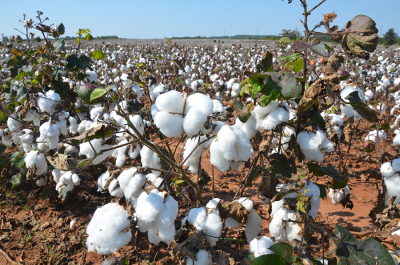Huntsville, Ala. ━ A Clemson University and HudsonAlpha Institute for Biotechnology project to explore the cotton genome and how it reacts differently in micro-gravity and normal gravity has been selected as a winner in the Cotton Sustainability Challenge. The Challenge, run by the Center for the Advancement of Science in Space, and sponsored by Target Corporation, provided researcher and innovators the opportunity to propose solutions to improve crop production on Earth by sending their concepts to the International Space Station (ISS) U.S. National Laboratory.
Christopher Saski, PhD, associate professor in the Department of Plant and Environmental Sciences; and Jeremy Schmutz, co-director of the HudsonAlpha Genome Sequencing Center; will lead the project.
“We are using a systems genomics approach in a very unique environment to fully understand the developmental programs and molecular mechanisms that orchestrate the regeneration of plant cells into whole plants,” Saski said. “This new understanding has the potential to unlock plant genomes to biotechnology and subsequently transform agriculture.”
“We will apply our experience to produce a novel reference genome of cotton and apply genomic tools to compare gene expression changes between space and earth plants, along with epigenetics, which are subtle accumulated changes to the functioning of DNA,” said Schmutz.
The challenge provided researchers a novel way to leverage microgravity to evaluate avenues for more sustainable cotton production. Cotton is a natural plant fiber produced in many countries and one of the most important raw materials required for the production of textiles and clothing. Cotton cultivation requires sustainable access to natural resources like water that are increasingly threatened. This challenge sought to engage the creative power of the research community to leverage the ISS National Lab to innovate and generate ideas that will improve the utilization of natural resources for sustainable cotton production.
“To partner with a brand as recognizable as Target to bring awareness to cotton sustainability is a terrific opportunity to showcase the unique research facets of the International Space Station,” said CASIS Director of Commercial Innovation and Strategic Partnerships, Cynthia Bouthot. “We look forward to working alongside Target and our selected researchers as they prepare their journey to send innovative research to our orbiting laboratory.”
###
About HudsonAlpha: HudsonAlpha Institute for Biotechnology is a nonprofit institute dedicated to developing and applying scientific advances to health, agriculture, learning, and commercialization. Opened in 2008, HudsonAlpha’s vision is to leverage the synergy between discovery, education, medicine, and economic development in genomic sciences to improve the human condition around the globe. The HudsonAlpha biotechnology campus consists of 152 acres nestled within Cummings Research Park, the nation’s second largest research park. The state-of-the-art facilities co-locate nonprofit scientific researchers with entrepreneurs and educators. HudsonAlpha has become a national and international leader in genetics and genomics research and biotech education and includes more than 30 diverse biotech companies on campus. To learn more about HudsonAlpha, visit hudsonalpha.org.
About Clemson University: About Clemson University: One of the country’s most selective public research universities, Clemson University serves a uniquely driven and highly accomplished student body. Ranked as the 23rd best national public university by U.S. News & World Report, Clemson is a science- and engineering-oriented college dedicated to teaching, research and service. Clemson’s retention and graduation rates rank among the highest in the country for public universities. We’ve been named among the best public college values by Kiplinger magazine in 2017, and Princeton Review named us among the “Colleges that pay you back” in 2017. The research, outreach and entrepreneurial projects led by our faculty and students are driving economic development and improving quality of life in South Carolina and beyond. In fact, a recent study determined that Clemson has an annual $1.9 billion economic impact on the state. To learn more about Clemson University, visit clemson.edu.
About CASIS: The Center for Advancement of Science in Space (CASIS) is the non-profit organization selected to manage the ISS National Laboratory with a focus on enabling a new era of space research to improve life on Earth. In this innovative role, CASIS promotes and brokers a diverse range of research in life sciences, physical sciences, remote sensing, technology development, and education. Since 2011, the ISS National Lab portfolio has included hundreds of novel research projects spanning multiple scientific disciplines, all with the intention of benefitting life on Earth. Working together with NASA, CASIS aims to advance the nation’s leadership in commercial space, pursue groundbreaking science not possible on Earth, and leverage the space station to inspire the next generation.
About the ISS National Laboratory: In 2005, Congress designated the U.S. portion of the International Space Station as the nation’s newest national laboratory to maximize its use for improving life on Earth, promoting collaboration among diverse users, and advancing STEM education. This unique laboratory environment is available for use by other U.S. government agencies and by academic and private institutions, providing access to the permanent microgravity setting, vantage point in low Earth orbit, and varied environments of space.


